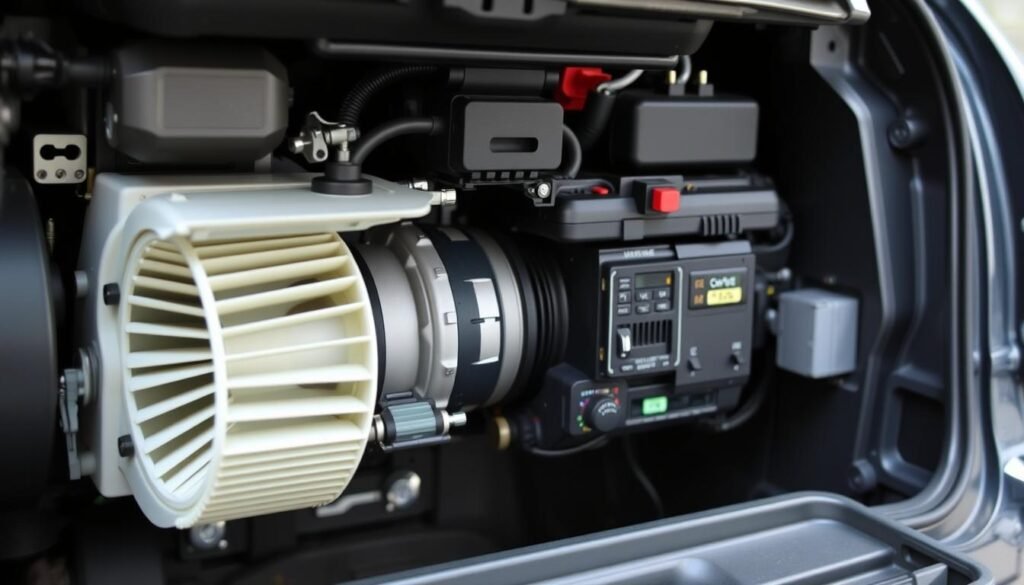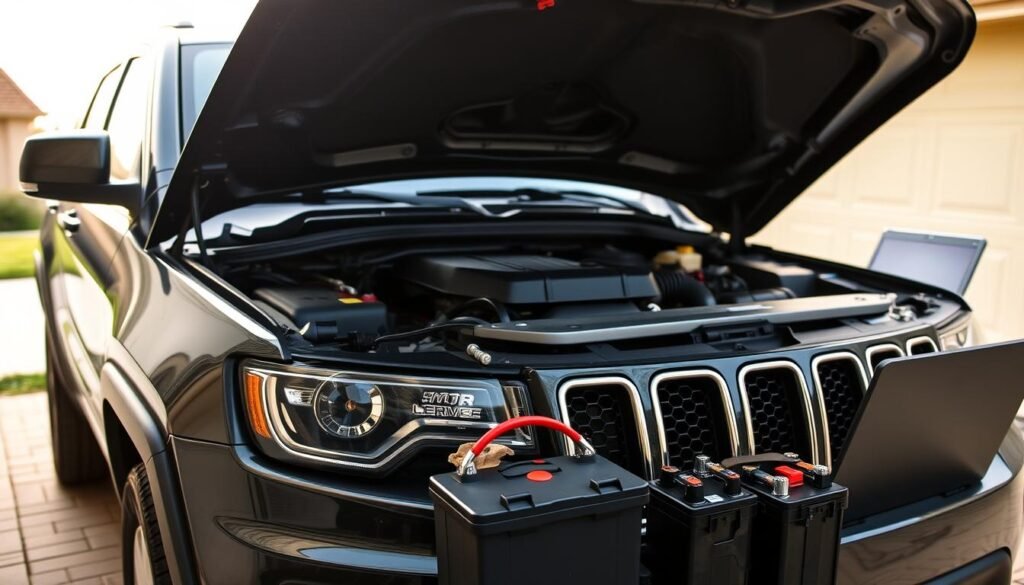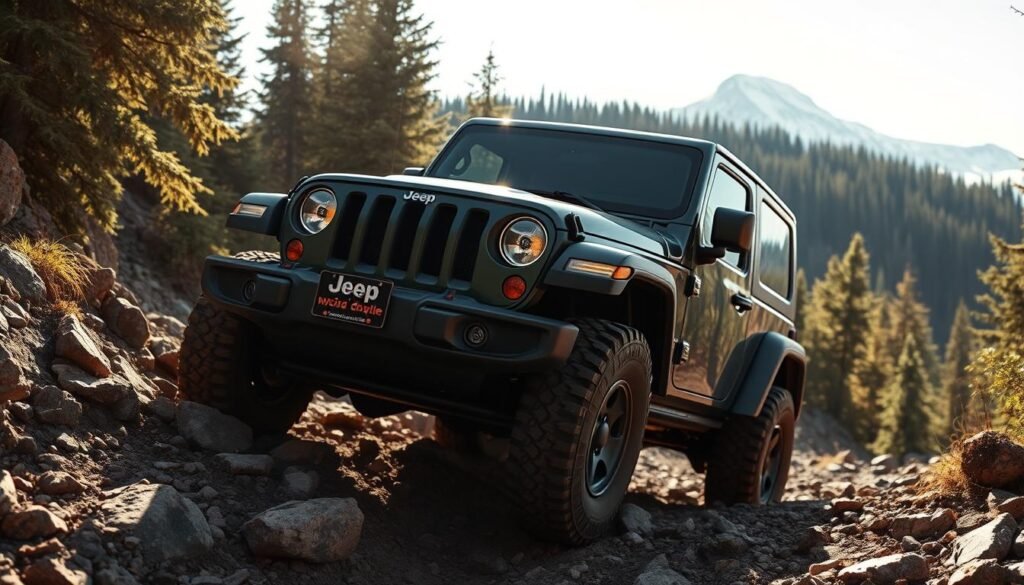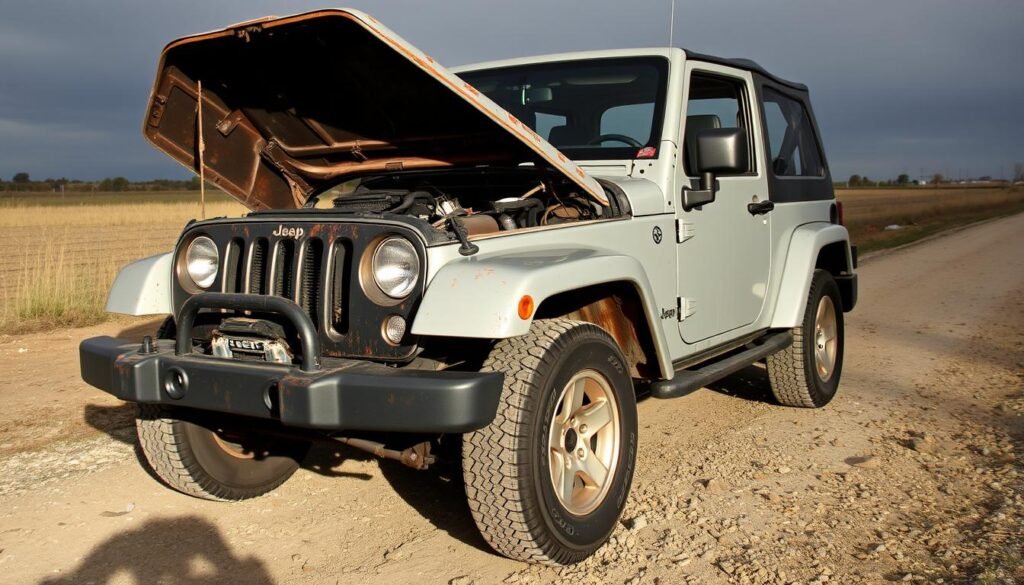The Jeep Grand Cherokee is a favorite SUV for its tough design and versatility. Yet, it has a history of mechanical troubles. Many drivers love its off-road skills, but buyers and owners should watch out for common problems that can affect how well the vehicle works and lasts.
Knowing about Jeep Grand Cherokee problems helps you make smart choices about upkeep, buying, and owning it for a long time. This guide covers common issues like transmission, electrical, suspension, and engine problems.
Many issues affect different parts of the vehicle, like the transmission, electrical system, suspension, and engine. To avoid these problems, Jeep Grand Cherokee owners and buyers should stay on top of maintenance.
Transmission Issues in Grand Cherokee Models
Jeep Grand Cherokee transmission problems are a big worry for many owners. These issues can be small annoyances or major failures. They can really hurt how well the car works and how reliable it is.
Transmission problems in Grand Cherokees show up in different ways. Drivers need to watch for certain signs. These signs can mean there’s a problem with the transmission.
Common Transmission Symptoms
- Delayed or harsh shifting between gears
- Unexpected service transmission warning messages
- Unusual noises during gear changes
- Uneven gear engagement
- Transmission slipping or unexpected jerking
Transmission Problem Statistics
| Symptom | Occurrence Rate |
|---|---|
| Delayed Shifting | 15-20% |
| Rough Shifting | 25% |
| Unusual Transmission Noises | 20% |
Preventive Maintenance Solutions
Keeping up with maintenance can help avoid transmission problems. Regular fluid checks and timely filter changes are key. Also, following the service schedule set by the manufacturer is important.
- Perform regular transmission fluid inspections
- Schedule periodic diagnostic scans
- Address warning signals immediately
- Follow manufacturer-recommended service schedules
Transmission Repair Costs
Fixing transmission problems in Jeep Grand Cherokees can be pricey. Costs can range from $1,500 to $4,000. Catching issues early and keeping up with maintenance can save a lot of money.
Proactive maintenance is always more cost-effective than reactive repairs.
Electrical System Failures and Solutions
Jeep Grand Cherokee problems often show up as complex electrical system failures. These can be frustrating for even the most experienced owners. Issues range from small, intermittent problems to big, persistent ones that need quick fixes.
Dealing with electrical challenges can be tough. Specialized Jeep diagnostics have found several key electrical system failures in different models:
- Engine starting difficulties
- Battery drain complications
- Intermittent electrical system interruptions
- Malfunctioning interior lighting
- Erratic gauge performance
Jeep Grand Cherokee electrical system failures can come from many places. This includes bad wiring, faulty control modules, and old electrical parts. Diagnostic complexity increases with vehicle age, so getting a pro’s help is key.
| Electrical Issue | Potential Causes | Recommended Action |
|---|---|---|
| Battery Drain | Parasitic electrical draw | Professional electrical system inspection |
| Gauge Malfunction | Faulty instrument cluster | Module replacement or recalibration |
| Start Failures | Ignition switch problems | Comprehensive electrical system diagnostic |
Experts say regular electrical system checks can prevent problems. Using advanced tools can spot and fix small issues before they get worse.
TIPM-Related Problems and Diagnostic Approaches
The Totally Integrated Power Module (TIPM) is key in Jeep Grand Cherokee’s electrical systems. It manages many electrical functions, making TIPM failure a big worry for owners.
Electrical issues in Jeep Grand Cherokees can come from TIPM problems. These issues can affect safety and performance. Knowing about these problems helps owners fix them early.
Signs of TIPM Failure
Spotting TIPM failure signs is important for keeping your vehicle running well. Look out for these signs:
- Unexpected dashboard warning lights
- Difficulty starting the vehicle
- Intermittent electrical system malfunctions
- Stalling or random engine shutdowns
- Flickering exterior or interior lights
Replacement Options
When the TIPM fails, you have a few repair options. A professional test can tell if you need a full replacement or just a fix. Companies like MAK offer affordable fixes for Jeep electrical problems.
Cost Considerations
Fixing a TIPM can cost a lot, from $500 to $1,200. Some owners might get help from the manufacturer, if there’s a recall.
Pro tip: Keeping your electrical system in check can avoid expensive TIPM failures in Jeep Grand Cherokees.
Engine Performance and Reliability Concerns

Jeep Grand Cherokee owners have faced big engine problems over many years. The 2011 model is a big issue, with 741 complaints about engine troubles. This shows how serious these problems are.
Some common engine issues in Jeep Grand Cherokees include:
- Frequent engine stalling
- Poor acceleration
- Excessive oil consumption
- Unexpected power loss
The 5.7L HEMI engine is a big topic in reliability talks. Engine problems can really hurt a car’s dependability and make owners unhappy.
| Model Year | Total Complaints | Engine-Related Issues | Average Repair Cost |
|---|---|---|---|
| 2011 | 741 | High | $1,500 |
| 2014 | 499 | Moderate | $3,000 |
| 2015 | 1,400 | Severe | $3,500 |
Keeping up with maintenance is key to avoiding engine problems in Jeep Grand Cherokees. Regular oil changes and quick fixes can stop expensive repairs and make the car last longer.
The 10-year average maintenance cost for a Jeep Grand Cherokee reaches $10,872, significantly higher than the industry average of $8,419.
Owners should watch for early signs like odd engine sounds, bad fuel efficiency, and sudden power drops. Getting a professional check-up and fixing problems fast can prevent big engine damage later.
Suspension and Steering System Defects
Jeep Grand Cherokee owners often face tough suspension and steering issues. These problems can affect safety and performance. Suspension issues are a big worry for many, with some years being worse than others.
The Jeep Grand Cherokee’s suspension can have several complex problems. Owners need to watch out for these issues:
- Uneven tire wear
- Clunking noises during driving
- Reduced vehicle stability
- Unexpected steering vibrations
Death Wobble Phenomenon
The “death wobble” is a scary steering problem in Jeep Grand Cherokees. It’s a violent shaking of the steering wheel at high speeds. This usually happens when suspension parts wear out or the steering gets misaligned.
Air Suspension Failures
The Quadralift air suspension system in Jeep Grand Cherokees can have big problems. Jeep Grand Cherokee Problems with air suspension include:
- Air compressor malfunction
- Leaking air springs
- Electronic control module failures
Common Steering Problems
Steering system defects can make driving very dangerous. Signs include stiff steering, unexpected vibrations, and losing control of the vehicle.
| Suspension Issue | Estimated Repair Cost | Affected Model Years |
|---|---|---|
| Full Suspension Replacement | $1,200 – $2,600 | 2011, 2014 |
| Installation Costs | $200 – $230 | Varies by region |
Regular maintenance and quick action to early signs can help avoid suspension and steering problems in Jeep Grand Cherokees.
HVAC System Malfunctions and Repairs

Jeep Grand Cherokee owners often face HVAC system problems. These issues can make driving less comfortable. The heating, ventilation, and air conditioning system can be tricky to fix.
Some common issues include:
- Inconsistent temperature control
- Reduced airflow from cabin filters
- Malfunctioning compressor
- Unexpected AC power cycling
About 20-30% of Jeep Grand Cherokee owners deal with AC problems. Blend door actuator failures are common, affecting 10-15% of vehicles. These failures can make the temperature change too much.
Several factors can lead to HVAC system problems:
- Clogged cabin air filters
- Extended AC system usage
- Condensation in humid conditions
- Mechanical wear of internal components
Fixing Jeep Grand Cherokee HVAC system issues can cost around $300. It’s wise to get a professional inspection, which is more important for older models. Regular maintenance can prevent 40-50% of common HVAC problems.
Pro tip: Use professional manifold gauges for accurate AC system diagnostics instead of relying on home charge kits.
Knowing about these issues can help Jeep Grand Cherokee owners fix HVAC problems early. This can save money on future repairs.
Jeep Grand Cherokee Problems: Most Critical Years to Avoid
Not all Jeep Grand Cherokee model years are the same. Some years have big problems that buyers should think about. Knowing the worst model years can help you avoid costly repairs and surprises.
Looking at the most problematic Jeep Grand Cherokee years, we find some models get a lot of bad feedback. Owners and car experts often share their concerns.
2004 Model Year: A Reliability Nightmare
The 2004 Jeep Grand Cherokee is one of the worst years. It has several major issues.
- Low FIXD reliability rating of 3/10
- Poor NHTSA crash test performance
- Multiple investigations and recalls
2011-2015: Challenging Years for Grand Cherokee
The 2011-2015 years were tough for Jeep Grand Cherokee owners. These years had many mechanical and electrical problems.
| Model Year | Total Complaints | Key Issues |
|---|---|---|
| 2011 | 755 | TIPM failures, transmission problems |
| 2014 | 499 | Brake fluid leaks, wiring system issues |
Recent Model Concerns
Newer models have seen some improvements, but the 2021 and 2022 Jeep Grand Cherokee L have their own issues. Uconnect system failures and multiple recalls have been reported, showing possible reliability problems.
Safe model years include 1998, 1999, 2005, 2017, and 2018. Always do your homework and get a professional inspection before buying a used Jeep Grand Cherokee.
Fuel System and Performance Issues
Jeep Grand Cherokee problems often show up in the fuel system. These issues can really hurt how well the vehicle runs. Owners often face fuel-related problems that need quick and careful fixing.
Some common fuel system problems in Jeep Grand Cherokee models include:
- Fuel pump failures that mess with engine performance
- Clogged fuel injectors that cut down on fuel efficiency
- Fuel line separation that could start a fire
- Starting delays and engine that doesn’t run smoothly
The fuel system’s health is key to the Grand Cherokee’s performance. Experts say it’s smart to check for fuel system weaknesses early to avoid big repairs.
When fixing Jeep Grand Cherokee fuel system issues, mechanics usually do:
- Check the fuel pressure
- Look at the fuel line for damage
- Test if the fuel pump is working right
- Check how sensors are doing
Reports from owners show fuel system problems can cause weird car behavior. This includes engines running when they shouldn’t and uneven acceleration. These issues highlight the need for regular upkeep and early diagnostic checks.
Fixing fuel system issues early can save you from expensive repairs and keep your Jeep Grand Cherokee running well for a long time.
It’s important for owners to use good quality fuel, keep fuel filters clean, and get regular checks from pros. This helps avoid fuel system problems in their Jeep Grand Cherokee.
Essential Maintenance Tips for Grand Cherokee Owners
Keeping your Jeep Grand Cherokee in top shape is key. Regular care stops big problems before they start. This way, you avoid expensive fixes.
Knowing the right maintenance tips can make your vehicle last longer and run better. Here are the top tips for Grand Cherokee owners:
- Oil Changes: Change oil every 7,500 miles or six months. It keeps the engine healthy and stops performance drops.
- Tire Maintenance: Rotate tires every 7,500 miles. It makes them wear evenly and boosts fuel efficiency by up to 3%.
- Fluid Checks: Check engine oil, transmission fluid, brake fluid, power steering fluid, and coolant levels often.
Transmission care is very important for Jeep Grand Cherokee owners. Change transmission fluid every 30,000 to 60,000 miles. Also, replace spark plugs every 30,000 miles for best engine performance.
Regular maintenance can prevent up to 80% of vehicle problems. It boosts reliability and longevity.
Don’t ignore small issues. They can turn into big, costly problems. Follow the manufacturer’s advice and stay ahead of maintenance. This keeps your Grand Cherokee reliable and saves money over time.
- Keep a consistent maintenance schedule
- Address warning lights right away
- Find a mechanic who knows Jeep vehicles
- Use parts recommended by the manufacturer
With the right maintenance and care, your Jeep Grand Cherokee will stay reliable and fun for years.
Jeep Grand Cherokee Recalls and Investigations
Jeep Grand Cherokee problems have caught the eye of safety regulators. The National Highway Traffic Safety Administration (NHTSA) has looked into many model years. They found serious safety issues that owners need to know about.
Here are some important recall stats:
- 180 complaints submitted to NHTSA for the 2017 model
- 844 complaints for the 2015 model year
- Multiple critical safety investigations spanning different model years
Some key areas of investigation include:
- Electrical system failures
- Transmission malfunctions
- Unexpected vehicle behavior
- Safety component defects
Owners should act fast if there’s a recall. Use the NHTSA website to check your VIN for recall notices. Dealerships will fix these issues for free, keeping your car safe and running well.
Safety first: Always verify your Jeep Grand Cherokee’s current recall status to prevent possible mechanical or safety risks.
Investigations have found major problems with Jeep Grand Cherokees. These include:
- Spontaneous sunroof shattering
- Dashboard electronics failing
- Unexpected brake engagements
- Transmission control issues
Fixing these issues can cost a lot, up to $8,000 for a new transmission. It’s vital for Jeep Grand Cherokee owners to stay up-to-date on recalls and investigations.
Weighing the Pros and Cons: Is a Jeep Grand Cherokee Right for You?
Thinking about getting a Jeep Grand Cherokee? You need to look at its good points and any problems it might have. The 2022 update made it safer, with new safety features on all models. Despite some issues, it’s a great choice for those who want a versatile and capable SUV.
The Grand Cherokee is known for its off-road skills and lots of room for cargo. It can hold 37.7 cubic feet of stuff, growing to 70.8 cubic feet when the second row is folded. But, there are some downsides like poor visibility from thick A-pillars and sometimes, issues with the Uconnect 5 system.
Fuel efficiency varies by model. The V-6 engine gets 22 mpg combined, while the V-8 engine gets 17 mpg. Prices range from $38,325 to $64,780, fitting different budgets. It’s important to consider the good and bad points, like its safety features and versatility, before deciding.
Before buying, take it for a spin and get a professional to check it out. The Jeep Grand Cherokee is a good pick for those who value performance and flexibility. But, it’s key to know both its strengths and weaknesses before making a choice.
FAQ
What are the most common transmission problems in Jeep Grand Cherokee models?
Jeep Grand Cherokee owners often face issues like harsh shifting and gear slipping. These problems are common in models with 8-speed automatic transmissions, from 2011-2016. Regular fluid changes and inspections can help prevent these issues.
How serious is the TIPM (Totally Integrated Power Module) issue in Jeep Grand Cherokees?
The TIPM can cause electrical system malfunctions. This includes unexpected pump failures and power window issues. Replacement costs are between $500 to $1,200. It’s important to address symptoms early to avoid more damage.
What is the “Death Wobble” in Jeep Grand Cherokees?
The “Death Wobble” is a violent steering wheel vibration at highway speeds. It’s often caused by worn suspension components or misaligned wheels. It’s a serious safety concern that needs prompt attention.
Which Jeep Grand Cherokee model years should I be most cautious about?
Be cautious with the 2004, 2011, and 2012 model years. The 2004 models have electrical and suspension problems. The 2011-2012 models face TIPM failures and transmission issues. Always research and check the vehicle history before buying.
How can I prevent common Jeep Grand Cherokee problems?
Regular maintenance is essential. Follow the manufacturer’s service schedule and use high-quality fluids. Perform annual inspections and address warning lights quickly. Working with experienced Jeep mechanics can also help prevent major issues.
Are there recurring engine performance issues in Jeep Grand Cherokees?
Some models, like those with the 5.7L HEMI engine, have engine problems. These include excessive oil consumption and stalling. Regular oil changes and addressing warning signs can help prevent these issues.
What electrical system problems are most common in Grand Cherokees?
Owners often report issues with infotainment systems and power windows. Battery drain and unexpected malfunctions are also common. The TIPM is often the cause. Regular checks and early issue resolution can prevent costly repairs.
How expensive are typical Jeep Grand Cherokee repairs?
Repair costs vary widely. Transmission repairs can cost $1,500 to $4,000. TIPM replacements are $500 to $1,200. Major engine repairs can exceed $3,000. Extended warranties and maintenance can help manage these costs.


